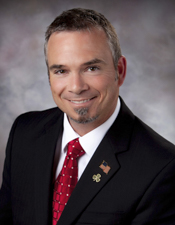Bill would help expand disability services aimed at helping people gain autonomy
People with intellectual or developmental disabilities often have more abilities and more options than they may realize, and can become their own most powerful advocates when given training and support.
“A key to our success as a state in supporting Minnesotans with disabilities is for individuals … to advocate for their own vision of what they want their lives to be like,” said Rep. Joe McDonald (R-Delano).
HF851, sponsored by McDonald, would appropriate $248,000 in Fiscal Year 2018 to provide grants that would maintain and expand services for people with disabilities to promote self-advocacy and develop leadership skills. It also calls for an ongoing base appropriation of $248,000, McDonald told the House Health and Human Services Reform Committee.
The bill was approved as amended Tuesday and referred to the House Health and Human Services Finance Committee. Its companion, SF664, sponsored by Sen. Jerry Relph (R-St. Cloud), awaits action by the Senate Human Services Reform Finance and Policy Committee.
“For many people, their entire life has been others trying to rehabilitate them. … A joy of the work we do is help people shift to think, ‘I’m OK the way I am … and I have a lot to contribute,’” said Mary Kay Kennedy, executive director of Advocating Change Together, a statewide disability rights organization that works with local partners to provide assertiveness and peer-to-peer skills training as well as disability rights education.
Lynnetta Muehlhauser, the mother of a 14-year-old with high-functioning autism, has personally seen the difference that a change in attitude and peer support can make. She encouraged the committee to pursue ways of encouraging the autonomy of intellectually and developmentally disabled people.
Since enrolling her son in Lionsgate Academy in Minnetonka, a school that specializes in teaching children with autism spectrum disorders, his confidence and engagement have increased significantly, Muehlhauser said.
“All of the teachers there are trained in disabilities and they accept the kids where they’re at … it wasn’t about what he couldn’t do, it was about how do we support what he can do,” she said.
Related Articles
Search Session Daily
Advanced Search OptionsPriority Dailies
Ways and Means Committee OKs proposed $512 million supplemental budget on party-line vote
By Mike Cook Meeting more needs or fiscal irresponsibility is one way to sum up the differences among the two parties on a supplemental spending package a year after a $72 billion state budg...
Meeting more needs or fiscal irresponsibility is one way to sum up the differences among the two parties on a supplemental spending package a year after a $72 billion state budg...
Minnesota’s projected budget surplus balloons to $3.7 billion, but fiscal pressure still looms
By Rob Hubbard Just as Minnesota has experienced a warmer winter than usual, so has the state’s budget outlook warmed over the past few months.
On Thursday, Minnesota Management and Budget...
Just as Minnesota has experienced a warmer winter than usual, so has the state’s budget outlook warmed over the past few months.
On Thursday, Minnesota Management and Budget...
